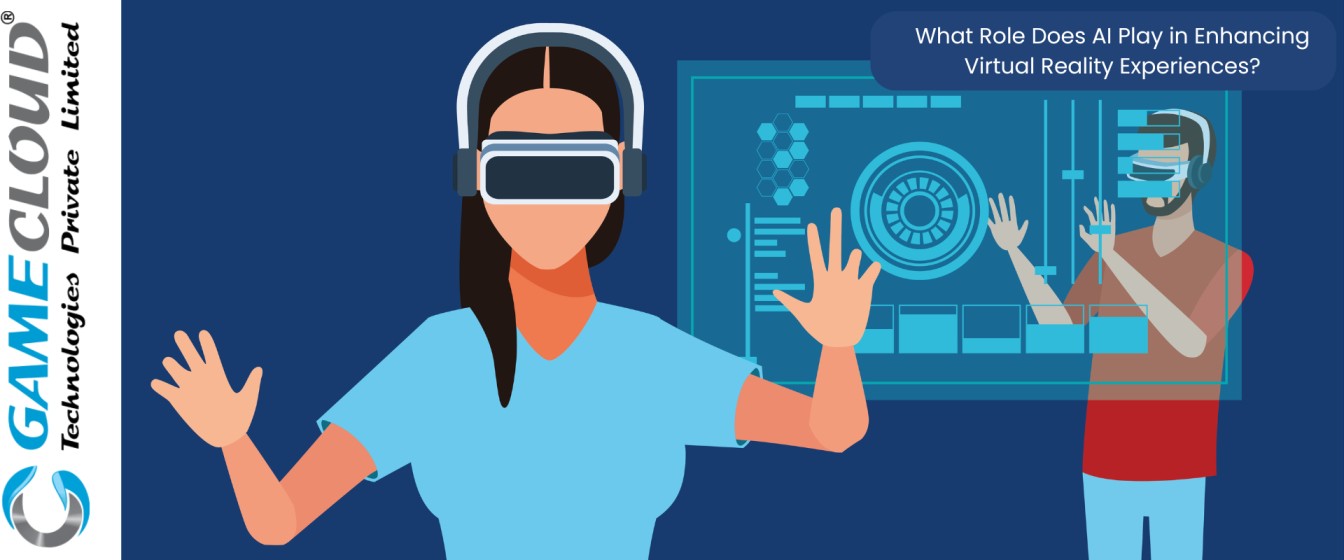
VR is rapidly becoming a cornerstone of innovation in industries such as gaming, healthcare, and education. The global VR market is forecasted to grow significantly, with experts anticipating substantial increases in adoption across these sectors. Gaming remains a dominant force in this space, driving much of VR’s momentum due to its ability to create immersive, lifelike experiences. Meanwhile, other industries are leveraging VR for medical training, simulations, therapeutic treatments and engaging learning environments.
AI has emerged as a crucial element in enhancing these VR experiences. By enabling dynamic, adaptive environments and smarter, real-time interactions, AI makes VR more immersive and personalized.
Creating Realistic and Immersive Environments with AI:
AI plays a pivotal role in making VR environments more realistic and immersive. By leveraging vast datasets from the real world, AI helps create detailed virtual environments that mirror real-life textures, lighting, and sounds. These realistic simulations are made possible through machine learning algorithms that continuously learn from real-world data, enhancing the visual and auditory accuracy of VR environments.
AI also facilitates dynamic world-building, where virtual environments change and adapt based on user interactions. For instance, if a user interacts with an object, the surrounding environment may shift accordingly, creating a more immersive experience. Machine learning further personalizes these environments by adapting to individual preferences, making each user’s experience unique. This constant adaptation ensures that the virtual world feels more responsive and engaging, pushing the boundaries of traditional VR experiences into more personalized, interactive realms.
Enhancing Interactivity and User Experiences:
AI significantly elevates interactivity within VR through advanced features like intelligent avatars, non-player characters, and voice recognition. AI-powered avatars and NPCs create more lifelike and responsive characters that can engage with users in real-time, adapting their behavior based on user input. This makes the virtual world feel more alive and interactive, enhancing the overall immersion.
AI also uses predictive modeling to anticipate user movements and interactions, leading to smoother and more intuitive VR experiences. By learning user behaviors, AI ensures that virtual environments respond promptly and accurately, reducing latency and improving fluidity during gameplay or other virtual tasks.
Furthermore, AI personalizes the VR experience by analyzing user data and preferences. It tailors virtual environments, interactions, and even challenges to suit individual users, ensuring a customized and engaging experience that evolves as the user spends more time in the virtual world. This makes the VR journey more enjoyable and tailored to personal preferences.
Unlocking Immersive Worlds: How QualityReality Revolutionizes VR Experiences:
At QualityReality, we are dedicated to delivering top-tier virtual reality experiences that transcend traditional boundaries. Our focus is on creating immersive, responsive environments that adapt seamlessly to user interactions, offering an unmatched level of engagement. Whether it’s for entertainment, education, or professional training, we leverage cutting-edge technology to build dynamic VR worlds that feel authentic and intuitive. Our commitment is to ensure that every user experience is personalized, innovative, and impactful, putting the user at the heart of the virtual journey.
Conclusion
In conclusion, AI plays a transformative role in enhancing the realism, immersion, and interactivity of virtual reality. By enabling dynamic world-building, intelligent interactions, and personalized experiences, AI significantly elevates the user experience. As AI and VR continue to evolve, the future promises even more innovative applications across sectors, offering users increasingly immersive and intuitive experiences. The growing intersection of AI and VR holds vast potential, reshaping industries and unlocking new possibilities for engagement and interaction in virtual environments.
For Know More Contact-Now
FAQ: How AI Enhances Virtual Reality Experiences
1. How does AI improve the realism of VR environments?
AI leverages real-world datasets and machine learning algorithms to create detailed virtual environments that closely mimic real-life textures, lighting, and sounds. It also enables dynamic world-building, where environments adapt to user interactions for a more immersive experience.
2. What role does AI play in VR interactivity?
AI enhances interactivity through intelligent avatars, non-player characters (NPCs), and voice recognition. These AI-driven elements respond in real-time, making virtual environments feel more alive and engaging. AI also anticipates user movements for smoother, more intuitive experiences.
3. Can AI personalize VR experiences for individual users?
Yes, AI analyzes user data and preferences to tailor VR environments, interactions, and challenges to individual users. This personalization ensures unique, evolving experiences that match each user’s needs and preferences.
4. What industries benefit most from AI-enhanced VR?
While gaming leads in VR adoption due to its immersive experiences, industries like healthcare, education, and professional training also benefit. AI-powered VR is used for medical simulations, therapeutic treatments, and interactive learning environments.
5. How is QualityReality advancing AI in VR?
QualityReality focuses on creating adaptive and immersive VR environments using AI. Their solutions prioritize responsiveness and personalization, providing innovative experiences for entertainment, education, and professional training.
